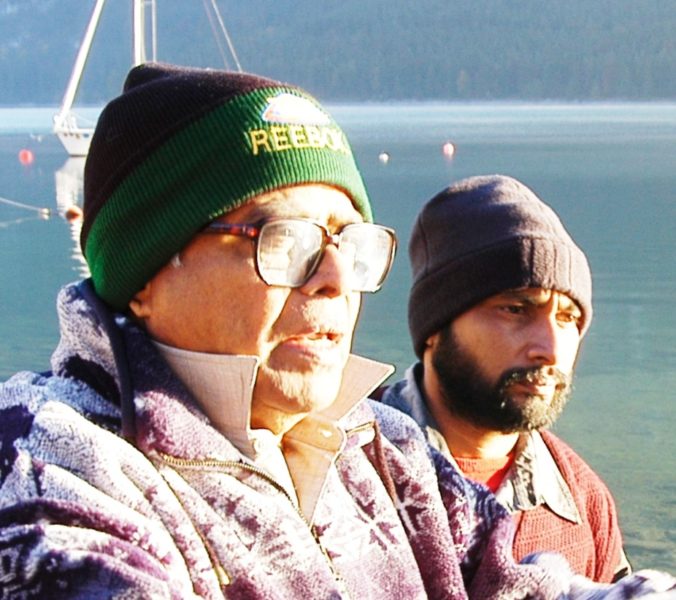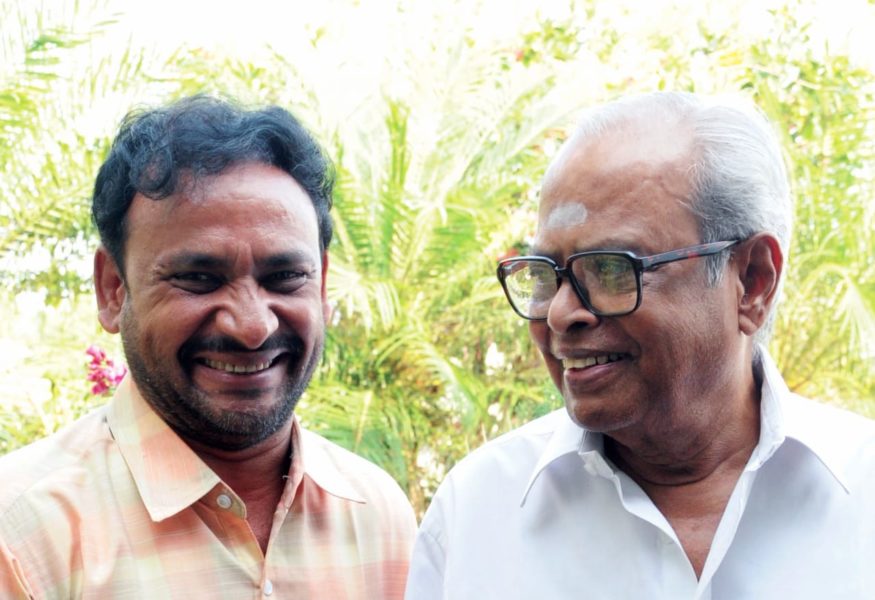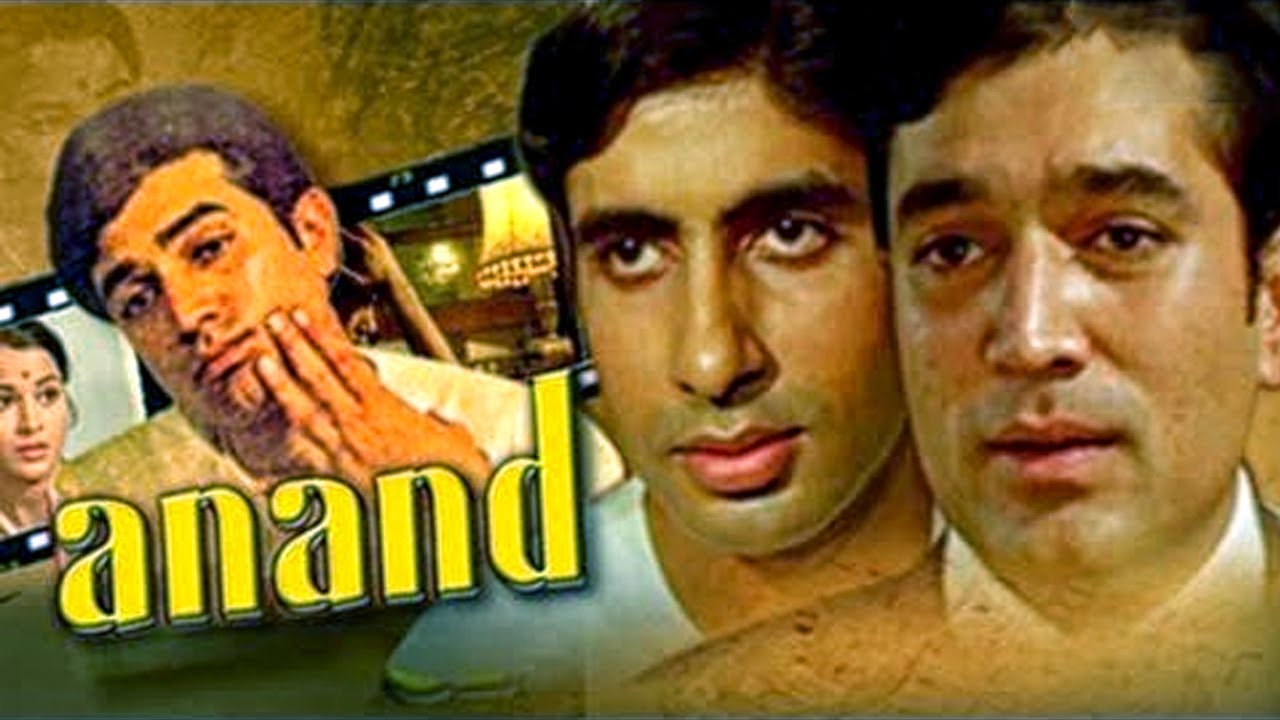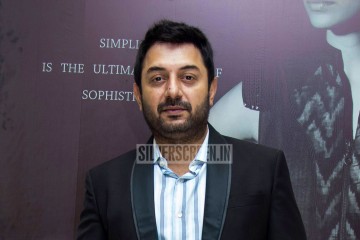When K Balachander strode like a colossus in the world of cinema and till his passing, there was a person who followed him like his shadow—his assistant N Mohan. He spent 27 years with his ‘Saar’, and carries with him a lifetime of memories, learning, and more.
Last week was KB’s 90th birth anniversary, but it was still his ‘birthday’ for Mohan, 55, who still lives in the rented house that the director’s wife Rajam and daughter-in-law Geeta Kailasam chose for him. Every time a journalist had to call KB Sir or whenever the director wanted to reach someone, the call would go to or come from Mohan. How did a boy from Madurai become the director’s right-hand man in his later years?
It all began shortly after Puthu Puthu Arthangal released in 1989. Mohan was working with Vetrivel Movies, a distribution company, which bought all of KB’s films from Thillu Mullu. “It was run by Murugesan and Jagadesan annachi. The former’s brother Jayapal got me a job there. I was there for seven years. When Director, Pyramid Natarajan, and Ananthu Sir would come to Madurai for story discussion, song composing, silver jubilee functions, or location scouting, I would receive them at the airport or railway station, and be ready with coffee, the newspaper, and tiffin. One day, they asked my boss if he could find someone like Mohan to be an assistant to KB Sir. Before I knew it, Murugesan Anna took me to Madras and told them he was giving them his right hand, a person he considered his son and someone whom he trusted with all his money. He told me I would have a better future in the city. And so, I began work at Director Sir’s office.”
For more than two decades, Mohan knew of no life beyond ‘KB Sir’, and that’s something those close to the director vouch for. “I normally would not take leave, and if at all I went back to Madurai, I would return within a day. If Sir had shooting at 6 am, he would get up at 4. I would manage his time, dates, logistics. In fact, Pyramid Natarajan Sir recognised my talent in maintaining accounts and encouraged me majorly. After shooting, Director would go to the editing suite and get back home by 10 pm. It helped that I lived on a street behind his. If there was no shooting, work would begin by 9 or 9.30. On free days, the evenings would be spent watching plays or attending a film-related event. He loved watching movies, and I would take him to Inox in Citi Centre or to Prarthana Drive Inn, carrying along a chair and blanket. No one would recognise him.” In between all this, he would also be roped in to play some characters.

WhatsApp Image 2020-07-11 at 9.17.34 PM
Almost everyone who knows KB speaks of Mohan’s utmost devotion. Kavithalaya Krishnan, a long-time collaborator with KB, calls Mohan “an exceptionally loyal person who was devoted to KB. He’s the kind who will die for him”.
Mohan entered KB’s life when he was still making films, but not as frequently. Mohan was around when he branched into television, returned to theatre… “He always adapted to the changing environment. That was a big lesson for all of us”.
Balachander was known to be a perfectionist and not an easy person to please, but Mohan managed that to a great extent. “He believed in discipline, dedication, and doing everything the right way. And, I learnt, seeing him.” In the director’s later years, Mohan would hold his hand and escort him. “I now believe he’s holding me and helping me lead life,” says Mohan.
Balachander and Mohan’s relationship was more than that of a boss and staff; at times, they were father and son, at times, they were mentor and disciple, and at times, they were companions. “He would not like it if I went on leave. His face would wilt, but he’d send me home to see my family. My brother Rajan handled all work on the home front,” says Mohan, who would dash back as fast as he could. Krishnan remembers how he would always get a call when Mohan went on leave. “The first thing Sir would say is ‘Mohan ooruku poitaanda’. It was a void for him that I temporarily filled!”
Mohan says a film of the director that’s closest to him is Kalki. “I am like the artwork of a sculptor chiselling herself that was featured in the film. All thanks to director Sir. I was a typical Madurai man, who loved anger and was a rough and tough character. And, who did I come to work for? A man who was like the military officer in Major Chandrakanth. A man who knew that if he turned to his left he would find a water bottle, to the right, a torch. A man who would know if the clock was slow by a minute, who would immediately figure someone had left a book in the library turned upside down. Of course, I changed,” he laughs.
KB’s love for gardening is known to his inner circle. “He was so keen on gardening. If he had a free day, the previous day he would tell me that we would be sprucing the garden. After the garden, we would go to his books, he loved dusting and arranging them in order. He would never really relax; he would create work for himself. If nothing else, he would tear used sheets and set aside the blank side for re-use.”
When Mohan speaks of how KB would dress up on a daily basis, you can almost envision the end result. “An ironed white shirt and trousers, Vicks inhaler, handkerchief, pen and small notepad in the pocket, white shoes, vibhuti, clean shave, not a hair out of place, nails neatly trimmed.”
When invited for functions, Mohan would make three copies of his speech. He’ll leave one at home, keep one for himself and give me one. If someone wanted a signed copy of his brilliant speech that was full of wit and wisdom, he’ll take both our copies, and if more people wanted it, I would send it to them from the copy we had at home.”
Mohan was also said to be the perfect gatekeeper, so perfect, the call asking KB his okay for the Dadasaheb Phalke Award almost went unanswered. “They kept calling and speaking in Hindi before I realised it was a genuine call and gave it to Sir,” smiles Mohan. Krishnan puts this down to Mohan’s protective instinct. “I would say he extended Sir’s physical and professional life by a good number of years with his care. It was heartwarming that there was someone Mr. Balachander could completely depend on, someone who he cared for and trusted,” he says,” he says.

WhatsApp Image 2020-07-11 at 9.17.51 PM
KB also had his favourite dishes. He loved masala dosai and thayir saadham, and among their regular haunts was Mahamudra, Peters Road Hotel Saravana Bhavan and Woodlands Drive-In. For a man who was a chain smoker, KB gave it all up after a heart attack and ensured his shooting spot was a disciplined zone too.
As a teacher, KB believed in showing by example, says Mohan. “They all learnt seeing him. Vasanth, Suresh Krissna, Samuthirakani, Charan, Hari, CJ Bhaskar, Naga, Selvaraghavan…” says Mohan.
Despite his age, KB was relatively healthy, but the demise of his son Bala Kailasam crushed him. “He never really recovered from that,” says Mohan. In fact, he had even readied a script, but it was not to be.
In his last few days, Mohan was at his bedside in Kaveri Hospital, Chennai. “He would keep saying, Mohan engeyum pogadhada,” recalls Mohan, saying, “Sir began his life in Nannilam, a place where the Cauvery flows. His discussion room is called Kaveri, and he bid goodbye to the world from Kaveri too.”
For some months after his death, Mohan was desolate. That’s when producer Kalaipuli S Thanu, who was a good friend of KB’s, roped him in to work in his office. After some time there, he went to work with Samuthirakani, who was keeping a promise he made to his guru, that Mohan will be cared for. “Samuthirakani Sir told me that ‘Anne, if you’re with me, it’s like being with Sir’. I agreed, because we all loved Sir in our own way, and Samuthirakani’s office is like home.”
Samuthirakani says that the director and Mohan shared a special bond. “Mohan would understand what he wanted, without it being told. When I went to visit him at home once, we laughed so much the nurse walked into the room to tell me to leave. That’s when he told me that Mohan must never be left alone. ‘Avana paathuko’, he said. How could I not?”
Mohan stays in touch with KB’s family and that of his first employer in Madurai too, but he’s now at home with Samuthirakani. “The working style is the same. And he knows me,” says Mohan.
In all this, giving Mohan company is his wife Latha. “I did not get married for a long time. Then, sometime in 2010 or 2011, Thanu Sir repeatedly told KB Sir that he should arrange my marriage. Within some months, they got me married and presided over it. He wrote the invitation in his own hand. Those days I was very content being with KB Sir. But for Thanu Sir, I would be without any support system now.” Thanu remembers this well. “Mohan dedicated his life for KB. Mohan was his support system and did not think of his life at all. I’d say Mohan and KB are like Hanuman and Ramar. Without one, there’s no other.”
As KB’s blessings, Mohan still holds some currency notes that the director signed and gifted him on special occasions. “One birthday, he told me he would not sign on the Rs 1,000 he gave me, telling me it might go out of circulation one day! I insisted he sign. He probably saw what would happen some years later. But, I still have that gift with me.”

WhatsApp Image 2020-07-12 at 9.39.19 AM
The two of them loved watching films too. “I think the last film he began watching was Parthiban’s Kathai Thiraikadhai Vasanam Iyakkam on DVD. Those days, he was very unwell and would not be able to watch a film in full.”
Recommended
Krishnan, who was once a beneficiary of Mohan’s largesse, he once sent him back to Chennai with two basketfuls of Madurai jasmine flowers, puts the relationship all of KB’s associates shared with the director in context. “KB never treated any of us as subjects or servants. He somehow comprehended the fact that we were devoted to him. He was tough, we all know. He tested Mohan hard. But, he could not live without him. He did not trust anyone more than him. The only thing he did not let Mohan do was fill ink in his pen and take it for repair to a specific shop in Vummidiars Shopping Centre on Mount Road. That was something he was very particular about. In every other way, Mohan was the protective shield around KB Sir.”



